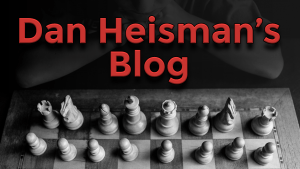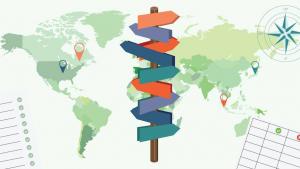Q&A with Coach Heisman Aug 31, 2012
In today's show there were many open-ended questions similar to "Hi! I'm 1600 and want to get to 1800. What books should I read?" or the more answerable "Hi! I'm 1600 and I want a good book on positional play. What do you recommend?"
There's a ton to be learned from chess books - I would be a hypocrite to say otherwise, since I own about 1,000 and have written 11 myself! But this "lock myself in the closet and read til I get better" quest doesn't bear as much fruit as you improve. Open-ended questions that ask for help without a fairly complete knowledge of the asker are difficult to answer, e.g. a 1400 who plays way to slowly usually requires completely different advice than a 1400 who plays way too quickly. A good positional book for a tactically competent 9 year old rated 1300 might not be appropriate for a tactically deficient but knowledgeable 50 year old with that same 1300 rating.
If you are rated 900-1500 and are in desperate need of tactics, then a book like John Bain's Chess Tactics for Students is excellent to use as a type of multiplication table - repetitive study of the most common patterns (non-book tools such as Chess.com's Tactics Trainer or Chess Mentor should be mentioned). Or if you need a start in game books or strategy, pick up Chernev's Logical Chess Move by Move or Coakley Winning Chess Strategy for Kids (it's excellent, not just for kids!), respectively. Again, my money is where my mouth is, as I recommend, at least in part, that any aspiring player use these books in articles such as The Four Homeworks (http://www.chesscafe.com/text/heisman68.pdf).
One common answer that covered many of those questions was to reference my Recommended Book page - http://danheisman.home.comcast.net/~danheisman/Events_Books/General_Book_Guide.htm). I often tried to give a brief answer (if it were possible; on some open questions it was difficult) but, if a much more comprehensive answer existed in one of my earlier columns or articles - or anywhere else - I made the reference.
I think almost every strong player has a large "non-book" component in their learning experience (see Every Good Chess Player http://www.chesscafe.com/text/heisman49.pdf). We could extend the idea of "book" in this context to include similar modern technology like videos or even software, too. All these tools are great, and even necessary, but it doesn't make them sufficient.
I think I speak from experience. I have taught almost 1,000 different students in one-on-one lessons and many start with the "books safe; humans dangerous" fear. They do want to lock themselves in a closet; I occasionally hear "I don't want to play in tournaments until I am good!" Or they exhibit a fear of live opponents in clubs and tournaments; some of these opponents are rude, play too fast, won't talk to them after the game, hang out with only their friends instead or... You get the idea - I address this type of problem in Breaking Down Barriers (http://www.chesscafe.com/text/heisman69.pdf).
In the long run if you have aspects for serious improvement - especially for titles like "expert" or "master" - the only places that grant these titles are serious, long time control, OTB events. And these live events also happen to be the single best source of chess experience; as one IM called it, "immersing yourself in the chess culture."
The "book" questions are legitimate and very heartfelt. Many don't have access to clubs and tournaments because they live in remote locations. For those without access, and even those that do, servers like chess.com are a modern blessing, providing live human opposition 24/7.
Another aspect to the "book" problem is that the searchers are hoping someone can suggest something akin to "Yes, if you read My System like I did when I was 1800, you too will understand positional play and improve greatly!" It's true a good book at the right time can help greatly (see Chess Books and Prerequisites at http://www.chesscafe.com/text/heisman06.pdf) but it's easy to go overboard in that direction.
Some of the "non-book" actions I advise include "Play lots of long-time control games slowly. Try to take almost all your time in the game. After the game ask your opponent if they would like to review the game with you. If you can, find a strong player and ask if they would be kind enough to review the game with you. If possible, try to play opponents who average slightly higher than you so that get pushed and learn things. Always try your best every move; if you don't feel like thinking that long, play a shorter time control game." If you want more, check out "My Top Tips for Improvement" at http://www.chesscafe.com/text/heisman133.pdf.
Many of the things these "book-seeking" players need the most are either not found in books or, if they are, they are either in basic books, or a note in a general improvement book that they never saw or never realized was key to their further progress. The abundance of good chess books can definitely help, but ignoring the other dimensions to improvement are going to result in diminishing returns.
One book that did get mentioned in an answer was the recently controversial Move First, Think Later by Willy Hendriks. I first addressed this book in my chess.com blog There is no Single Correct Thought Process (http://blog.chess.com/danheisman/there-is-no-one-correct-thought-process). Hendriks theme addresses his perceived fallacies of "expert" help (whether packaged in book form or not, although he seems to specialize in picking on Silman's books). I think his skepticism is healthy and much of his specific advice is good, although his occasional "the world is crazy but I am sane" approach is probably not the best for winning friends and influencing people.
One theme of the show was acquiring positional knowledge but, since there were few "position specific" questions today, I would like to show the final half of one of my very few positional wins (I think I have about two in my life ). It illustrates the power of a mobile majority vs. a non-mobile one. In this game I recognize the opportunity to create a queenside majority and that turns out to be the big difference:
). It illustrates the power of a mobile majority vs. a non-mobile one. In this game I recognize the opportunity to create a queenside majority and that turns out to be the big difference:
Hope you will tune in next time!






